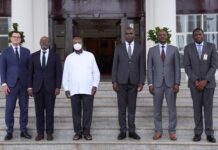By URN
Uganda is yet to use its positioning in the centre of Africa to dominate trade and travel, both regional and continental.
This is according to the figures at the East African Business Council (EABC) which specifically shows, for example, that the country is a net importer of transport services.
In 2023, Uganda exported transport services worth 0.18 Billion Dollars and imported 2.3 Billion worth,
According to the EABC, Uganda should be the transportation hub of the EAC being well-positioned at the centre, and use this position to dictate affairs in the African Continental Free Trade Agreement.
Adrian Njau, EABC Acting Chief Executive Officer says this is one of the reasons they have decided to partner with the German development agency (GIZ) to promote transport alongside tourism.
The EABC has launched region-wide sensitisation efforts for the private sector to make them ready for the opportunities presented by the AfCFTA in the services sector, mainly transport and tourism.
The two, Njau says, should also take advantage of the ongoing liberalisation of the African services sector.
“The aim is to ensure that the EAC countries become net exporters of these services as they are capable of developing the region and its citizens,” he said.
Estelle Aryada, the GIZ East African Advisor on Trade in Services and E-commerce they were funded by the European Union to promote trade on services and promote their liberalisation in the EAC.
“We want to ensure that the sectors are ready for the AfCFTA, and the effort will be extended from Uganda to other EAC countries, and hopefully to other sectors too,” Aryada said on the sidelines of the training of the private sector.
Jason Stewart Mweaigwa EABC board member and Managing Director, Roofings said the danger was in Ugandans failing to embrace globalisation and digitisation which were powering global development.
He said it was high time they started producing with the international market in mind, emphasizing quality and standards if they were to compete.
According to Mwesigwa, while this EABC initiative is currently targeting trade in services, AfCFTA covers all kinds of exports, including services, manufacturing, mining, and agriculture.
He said, however, accessing the market would require adding value to the products, otherwise no one would buy them.
He appealed to the governments the expedite the building of infrastructure, including soft structures like the free movement of persons across borders and a continental payments system to facilitate quicker trade.
“Someone from Rwanda should be able to trade their goods in Uganda using Rwanda currency and vice versa, or else there should be a single currency known as the African currency,” said Mwesigwa.
The AfCFTA is poised to be the largest free trade area since the formation of the World Trade Organisation, given the continent’s current population of 1.2 billion people, which is expected to grow to 2.5 billion by 2050. Some of its expected benefits include:
As of September 2024, 54 out of the 55 countries in Africa have signed the AfCFTA agreement, while 47 have ratified it.



